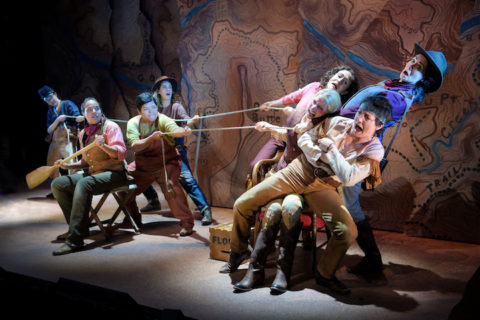
“Men on Boats” at the Actors Conservatory Theatre
Watching “Men On Boats,” the frontier adventure story now on stage at A.C.T.’s Strand Theater summons up memories of childhood; of the imagination’s ability to turn a small patch of yard into a roiling sea of pirate galleons, a World War II beachhead, or a high plains skirmish of cowboys and Indians.
Ummmm…make that cowboys and Native Americans. Or cowboys, cowgirls and Native Americans.
Playwright Jacklyn Backhaus has crafted a piece that blends the rollicking playfulness of an old-fashioned British panto with the identity-challenging subtexts of much contemporary American theater. Like that moist chocolate cake my mom once snuck full of good-for-you zucchini, “Men on Boats” is made to please and goes down easy.
Here, the added zucchini begins with an absence of eggplant: Per the playwright’s specifications, there are no men in the cast of “Men On Boats.” Instead, the ten torn-from the history books characters in Backhaus’ fact-based dramatization of the 1869 river expedition by John Wesley Powell—a government-sponsored journey that included the first traversal of the Grand Canyon by non-natives—are all played by women.
Director Tamilla Woodard has assembled a magnificent motley crew of local actresses to play the explorers. And, as in many an action-adventure movies with large male ensembles—”The Dirty Dozen,” “The Magnificent Seven,” “Ocean’s 11″—the core roles are distinguished from each other through singular, fine-etched character traits.
As the noble, one-armed Powell, reedy Liz Sklar serves up resolute idealism; Amy Lizardo plays the cook, Hawkins, as a jovial Mr. Smee sort. Sarita Ocón’s William Dunn personifies passion, self-assurance and pragmatism. Rosie Hallett’s map-maker, Hall, is a go-for-broke enthusiast. And as Goodman, a wealthy Brit, ill-at-ease amidst this rough and tumble crew, Arwen Anderson is a consistently skittish comic delight. There are also a keen green teenager (Katharine Romans), a pair of uncompromisingly blood-loyal siblings (Lisa Hori-Garcia and Lauren Spencer), and Powell’s own convincingly shell-shocked older brother (Annemaria Rajala).
Its so easy to understand this troop as a collection of familiar types. Not men, not women—types. In telling this straightforward adventure story, playwright, director and cast have built their characters around character. Not gender. And in doing so, they leave questions in viewers’ minds for later consideration without ever distracting from the gung-ho action on stage.
To this reviewer, the most interesting of those questions are not about why “Men In Boats” works as smoothly as it does with a non-male cast, but how—and why—it might feel askew with a mixed cast. How would audiences feel about a one-armed woman leading a mostly male crew? Would it feel provocative to have a male cook preparing the game brought in by a female hunter? What pushes ungendered types into gender stereotypes?
That said, in “Men On Boats,” Backhaus is focused more on celebration than provocation. She celebrates the freeing of female characters—and female writers— from tired tropes and assumptions, she offers a fresh reimagination of possibility.
The simple ingenuity of scenic designer Nina Ball’s sets (sliding, irregular shaped panels resembling topographic maps), prop master Jacquelyn Scott’s hand-held boat prows, and movement coach Danyon Davis’ swaying, shifting, rapids-riding choreography add to the childlike pleasures of getting caught up in an adventure story.
“Men On Boats” succeeds mightily in its evocation of child’s play and giddy potential. It also leaves lingering thoughts about the hard work our young country still faces: A maturely integrated society remains a far frontier.
